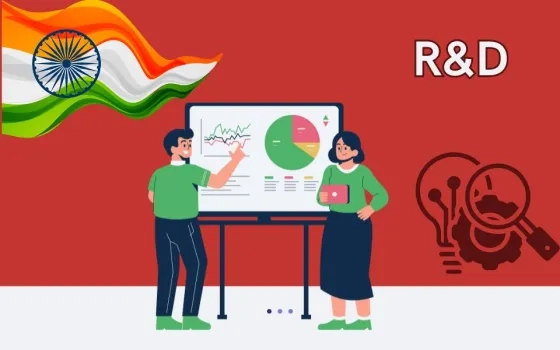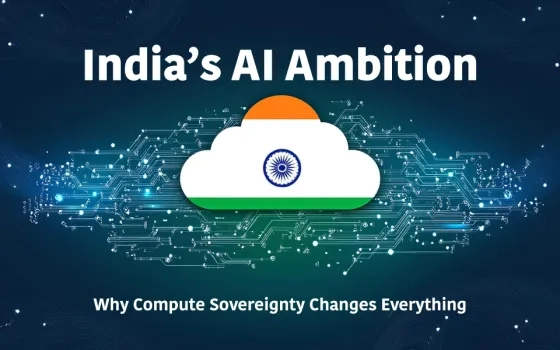The past month remained abuzz with activity in the tech domain. Both the government as well as private sector stakeholders undertook efforts to drive development of the ecosystem. Establishment of centres of excellence (CoEs) focused on cutting-edge technologies like artificial intelligence (AI) emerged as one key focus area during the month. However, the most significant move remained Green Climate Fund’s (the world’s largest climate fund), first investment in a climate venture fund in India, strengthening India’s position to take the lead in fostering the next-generation of climate-tech companies.
A look at the five noteworthy themes that emerged during the period…
Establishment of CoEs to encourage development of cutting-edge technologies
The establishment of CoEs was a key theme that emerged during the month. In Maharashtra, the government announced setting up of cutting-edge education hubs including CoEs in Al, robotics, internet of things (IoT), Industry 4.0, 3D printing and allied technologies. The initiative is expected to create significant opportunities for students, providing them with the necessary skills and job placements to succeed in the rapidly evolving technological landscape.
Further, three AI CoEs focused on vital sectors like healthcare, agriculture, and sustainable cities were announced to be set up in New Delhi. A financial outlay of Rs 9.90 billion will be undertaken for the initiative during the five-year period between FY 2023-24 and FY 2027-28. AIIMS and IIT Delhi will spearhead the healthcare CoE, IIT Ropar will lead efforts in agriculture and IIT Kanpur will drive the sustainable cities initiative.
Among private players, Infosys launched a new Meta CoE at its Bengaluru campus. The CoE is dedicated to accelerating the adoption of Meta’s Llama models and will focus on developing industry-specific AI use cases. A unique feature of the CoE is an AI Experience Zone, where clients can experience enterprise AI solutions developed in partnership with Meta firsthand.
Moreover, Tech Mahindra announced the establishment of a CoE powered by Nvidia platforms to drive advancements in sovereign large language model frameworks, agentic AI and physical AI. The CoE would also use the Nvidia Omniverse platform to develop connected industrial AI digital twins and physical AI applications across sectors, including manufacturing, automotive, telecommunications, healthcare and banking, financial services and insurance.
Strengthening foothold in key verticals
Several partnerships were also forged during the past month, most of them aimed at strengthening tech companies’ offerings in key industry verticals. To this end, Tech Mahindra partnered with Verint to improve customer experience (CX) at the Bank of Baroda. The partnership would involve leveraging Verint’s automated quality management and speech analytics solutions to enable the bank to personalize customer interactions, optimise resources, and improve the overall CX.
Further, LTIMindtree partnered with ServiceNow to launch the ‘AI-Smart Underwriter’ solution to help underwriters make more informed, data and AI-driven decisions, while improving efficiency through intelligent automation. The solution aims to simplify the insurance underwriting process.
Additionally, Infosys Finacle, part of EdgeVerve Systems, a wholly-owned subsidiary of Infosys launched its Finacle Data and AI Suite, that aim to empower banks to infuse AI into their digital operations and accelerate their enterprise AI journey. The suite will offer a comprehensive set of platforms that enable banks to build low-code, predictive as well as generative AI solutions from the ground up with high transparency and explainability.
Meanwhile, Wipro announced a strategic partnership with RELEX Solutions, a provider of unified supply chain and retail planning solutions. The partnership combines Wipro's deep expertise in the retail and consumer packaged goods (CPG) sectors with RELEX's AI-based supply chain and retail planning platform. The platform enables retailers, wholesalers, and consumer goods companies to maximize sales, minimize costs, and reduce waste by optimizing demand, merchandise, supply chain, and operations planning across their value chain.
Consolidating global ties to drive innovation
The country also continued consolidating its position in the global tech landscape through strategic alliances. In this regard, nasscom entered into a partnership with Dubai Internet City to drive technological innovation and foster cross-border talent development on the sidelines of GITEX Global. Under the partnership, Dubai Internet City, one of TECOM Group PJSC's 10 vibrant sector-specific business districts in the city, will offer support and guidance to nasscom members navigating the process of establishing presence within its business community, ensuring a smooth and efficient experience to start and set up business operations.
Advancing the AI ecosystem
Both the government and private sectors remained active in advancing development of India’s AI ecosystem. On the government side, the Tamil Nadu government announced that it will be implementing the Tamil Nadu Artificial Intelligence Mission (TNAIM) to position the state as one of the leading AI hubs in the next five years. The government has allocated Rs 139.3 million for implementation during the first two years. The mission will focus on research and developing AI-driven solutions for governance.
Private tech companies also remained active in the AI space. To this end, Meta entered into a strategic collaboration with 'IndiaAI' at the Ministry of Electronics and Information Technology (MeitY) to drive advancement of open source AI innovation, R&D and skill development in India. The collaboration effort includes the establishment of the Center for Generative AI, Shrijan at IIT Jodhpur and the launch of the 'AI for Skilling and Capacity Building' initiative, in partnership with All India Council for Technical Education (AICTE). The partnership will enable development of indigenous AI applications and advance skill development in AI.
To encourage and assist early-stage AI startups, Google announced a suite of initiatives and partnerships aimed at assisting these startups in building, growing, and scaling AI-powered solutions with the help of Google Cloud, at its AI Startups Summit in Bengaluru. As part of the support framework, early-stage founders will gain access to the Google for Startups Cloud Program, which will provide $200,000 in Google Cloud credits over two years. Recognising the higher computational demands for AI-focused projects, Google has also extended an additional $350,000 in credits specifically for AI-first startups.
Garnering $135 million funding to power climate tech start-ups
The most remarkable move in the clean tech space remained Green Climate Fund (GCF) and other renowned institutional investors infusing $135 million in Avaana Climate and Sustainability Fund. This was GCF’s, which is the world’s largest climate fund, first investment in a climate venture fund in India. The Fund will help build the next-generation of climate-first companies to transform key sectors and make meaningful progress toward a sustainable future. It will focus on three core sectors that account for 90 per cent of India’s carbon emissions: Energy and Resource Management, Mobility and Supply Chains, and Sustainable Agriculture and Food Systems.
Conclusion
Overall, the month remained action-packed for the Indian tech sector. The establishment of CoEs by the government as well as the private sector is expected to serve the dual purpose of promoting innovation and imparting relevant industry-facing skills to students. Further, CoEs by the likes of Infosys and Tech Mahindra will help accelerate the development of industry-specific AI use cases. The strengthening of offerings in the banking, insurance and retail segments shows how modernising vertical-specific solutions continues to be a key focus area for tech companies.
Meanwhile, the Tamil Nadu Artificial Intelligence Mission represents a good example of how states can take the lead in developing AI hubs across India. If implementation challenges like multiple regulatory approvals, provision of adequate computational infrastructure, policies aimed at prevention of AI misuse etc are addressed and timely execution is prioritized, other states would also be able to replicate the framework.
Lastly, GCF’s funding to the Avaana Climate and Sustainability Fund is an indication of how GCF remains optimistic about India's potential in catalysing meaningful climate-tech solutions by leveraging Avaana’s focus on transformative technologies. Together, this synergy can help accelerate India’s journey towards net-zero emissions and create scalable models for other emerging markets.


















